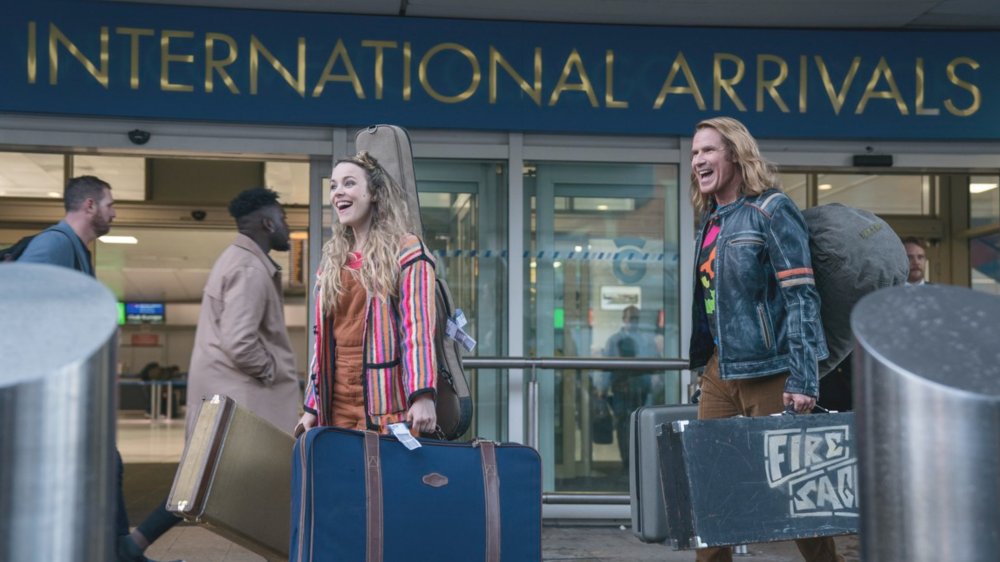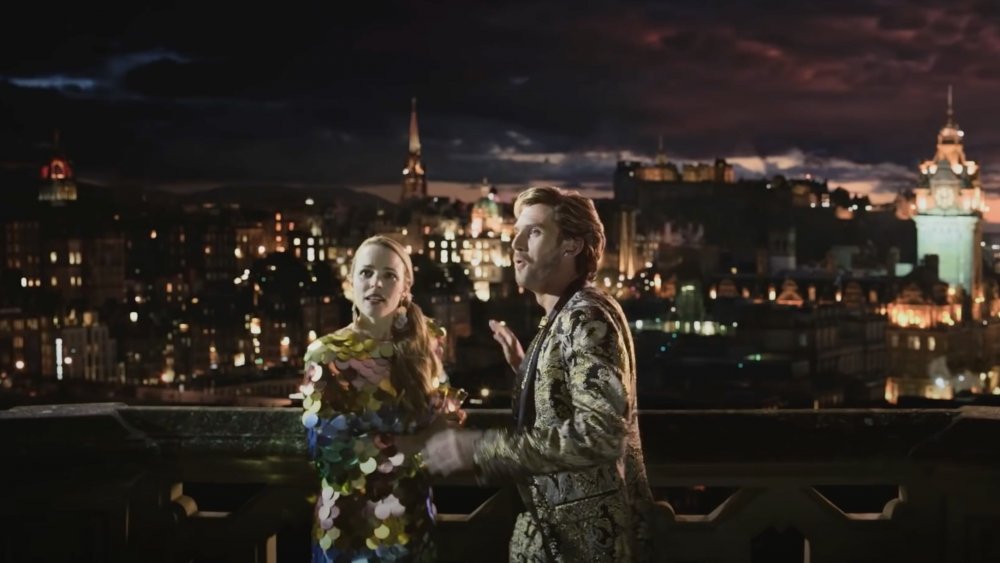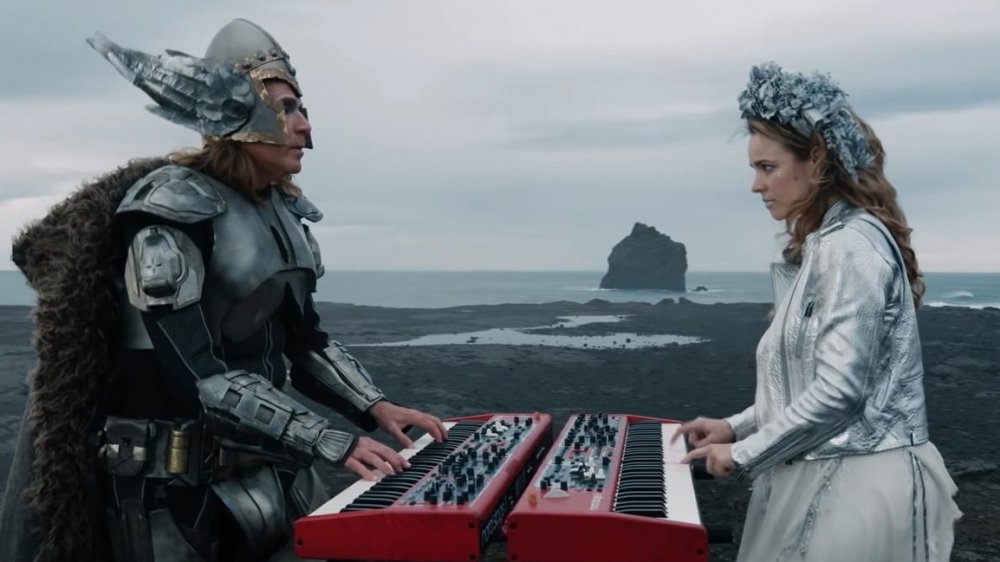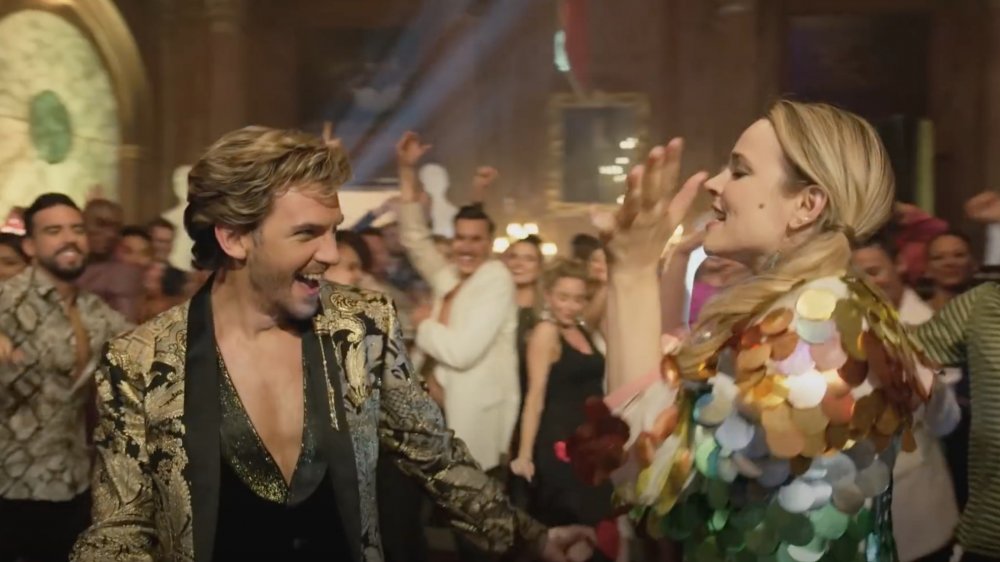This Is Where Eurovision Song Contest Was Actually Shot
Against all odds, Netflix may end up saving 2020's summer movie season. The latest entry into the streaming giant's summer slate is Will Ferrell's big, boisterous, go-for-broke musical comedy Eurovision Song Contest: The Story of Fire Saga. The film finds Ferrell and Rachel McAdams re-teaming with their Wedding Crashers director David Dobkin for the globe-trotting tale of Icelandic pop duo Lars Erickssong and Sigrit Ericksdóttir, who dream of making it big by winning the famed music competition Eurovision Song Contest.
Penned by Ferrell and co-writer Andrew Steele, Eurovision Song Contest only recently made its Netflix premiere on June 26, and it's been earning solid reviews from viewers who, let's be honest, could all really use a good laugh right about now. It seems there are at least two elements of Eurovision Song Contest that everyone can agree are utterly fantastic: the film's catchy original songs, and the film's visual aesthetic, with Eurovision Song Contest's Oscar-nominated cinematographer Danny Cohen capturing the stark beauty of every interior and exterior with eye-popping elegance.
To the surprise of many, it turns out that Dobkin, Cohen, and the rest of the Eurovision Song Contest production team filmed those images on-location — hitting spots all over Europe and beyond to do so. Here's where Eurovision Song Contest was actually shot.
Scotland features prominently in Eurovision Song Contest
In Eurovision Song Contest: The Story of Fire Saga, Scotland serves as the host country for the titular competition. The event unfolds in Scotland's seaside capital of Edinburgh, so it only makes sense that the city gets lots of screen time in the film. The glorious Edinburgh skyline gets a dramatic close-up as the jaw-dropping view from the "backyard" of Alexander Lemtov's (Dan Stevens) castle, and much of the city's hilly landscapes are frequently featured in the flick as well — as is the city's marvelous mix of gothic and neo-classical architecture.
However, the airport in which Lars and Sigrit make their various arrivals and departures throughout Eurovision Song Contest isn't in Edinburgh — nor is the mammoth, spectacularly lit arena that serves as the host venue for the actual competition in exterior shots. Interior concert scenes were shot either at the actual 2019 Eurovision competition in Israel, or, according to Dan Stevens' interview with CinemaBlend, on a sound stage in London. The airport seen in the film is Glasgow International, located in Scotland's second-most populous city.
As for the venue, it's called the SSE Hydro. It's also located in the heart of the greater Glasgow area, and it plays host to all manner of musical and sporting events in the city year-round. Apparently, the SSE Hydro hasn't yet played host to the real Eurovision Song Contest, though. But after its appearance in the Eurovision Song Contest movie, we wouldn't be at all surprised to see that change.
Húsavík, Iceland is a real place, and Eurovision Song Contest actually shot there
Glorious as the images of Edinburgh and Glasgow throughout Eurovision Song Contest are, they have tough competition in the beauty department when it comes to those caught in the film's other primary location: Fire Saga's hometown of Húsavík, Iceland. As presented in the film, Húsavík is more or less an idyllic little fishing village in the far North of Iceland that feels more like fairytale than reality — even in spite of its boozy locals.
While we can neither confirm nor deny the hard-drinking ways of Húsavík's population, the rustic Icelandic town is very real and very stunning. And rather than try to fake it in a less out-of-the-way location, Dobkin and the rest of the Eurovision Song Contest team actually made the journey to the far Northern village to shoot scenes in the small, fantastical town that inspired Sigrit to song in the film's spirited final performance on the Eurovision stage.
In McAdams' own words to The London Free Press, the crew was more than fortunate both to shoot in Húsavík proper, and to get their film finished before actual volcanic activity might've interrupted the production. "We shot in Iceland right where there is volcanic activity (happening) right now on top of everything else. We were lucky on two fronts to get that finished."
And with Húsavík claiming a total population of around 2,300 year-round citizens. The town's minute population could be the reason it's been able to maintain its small-time charm, as well as the condition of the vistas of the surrounding hills and the gorgeous black-sand coastlines. Whatever the case, Húsavík very nearly steals the entire movie out from under its stars, if only for its unspoiled ethereal beauty.
Eurovision's song-along scene was shot on location at the Knebworth House in England
Though one could spend hours gazing longingly at the Icelandic vistas in Eurovision Song Contest, most will spend more time watching and re-watching the rollicking, star-studded "song-along" that breaks out mid-movie. Ferrell, McAdams, Stevens, and the vast array of former Eurovision competitors are having such a blast in the musical montage that it's almost easy to overlook the lavish environ in which their "Waterloo"-heavy moment erupts.
The sequence takes place in Knebworth House, the lush Tudor Gothic manor located an hour north of London. Knebworth House is the very picture of opulence, and therefore feels like the perfect sometimes-home of Stevens' absurdly wealthy character Alexander Lemtov. Once Ferrell, McAdams and the Eurovision Song Contest team made the trek to the extravagant locale, it more than served its purpose as party central for the film's rapturous musical mashup.
If Knebworth House looked a bit familiar to you, that's because Eurovision Song Contest isn't the first film to shoot there. The palatial dwelling has appeared in dozens of films over the years — including 1981's The Great Muppet Caper, 1989's Batman, 2005's Harry Potter and the Goblet of Fire, and 2010's The King's Speech. It's also played host to concerts by legendary rock acts like Led Zeppelin, Pink Floyd, Elton John, and Red Hot Chili Peppers — though it seems ABBA has never belted out their own version of "Waterloo" on the Knebworth stage.



